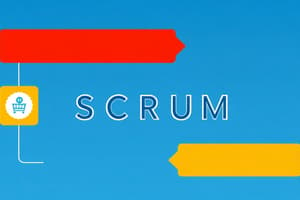Podcast
Questions and Answers
What is a key characteristic of Agile methodologies?
What is a key characteristic of Agile methodologies?
- Focus on customer feedback (correct)
- Strict adherence to a fixed plan
- Emphasis on comprehensive documentation
- Rejection of iterative development
Which Agile framework primarily utilizes time-boxed iterations known as Sprints?
Which Agile framework primarily utilizes time-boxed iterations known as Sprints?
- Feature-Driven Development (FDD)
- Scrum (correct)
- Kanban
- Extreme Programming (XP)
Which principle is NOT part of the Agile Manifesto?
Which principle is NOT part of the Agile Manifesto?
- Individuals and interactions over processes and tools
- Adherence to strict timelines over adaptability (correct)
- Customer collaboration over contract negotiation
- Working software over comprehensive documentation
What is a primary benefit of using Agile methodologies?
What is a primary benefit of using Agile methodologies?
What type of Version Control System allows for offline work and gives each user a full copy of the repository?
What type of Version Control System allows for offline work and gives each user a full copy of the repository?
Which of the following Agile practices involves pairs of developers working together at the same workstation?
Which of the following Agile practices involves pairs of developers working together at the same workstation?
Which framework emphasizes continuous delivery and limits work in progress?
Which framework emphasizes continuous delivery and limits work in progress?
Which type of Version Control System is reliant on a central server for collaboration?
Which type of Version Control System is reliant on a central server for collaboration?
What aspect of Agile methodologies focuses on adapting to changes?
What aspect of Agile methodologies focuses on adapting to changes?
Which practice is associated with Extreme Programming (XP)?
Which practice is associated with Extreme Programming (XP)?
Flashcards are hidden until you start studying
Study Notes
Agile Methodologies
-
Definition: Agile methodologies are iterative and incremental approaches to software development focusing on collaboration, customer feedback, and small, rapid releases.
-
Core Principles (Agile Manifesto):
- Individuals and interactions over processes and tools.
- Working software over comprehensive documentation.
- Customer collaboration over contract negotiation.
- Responding to change over following a plan.
-
Common Agile Frameworks:
- Scrum:
- Involves roles (Scrum Master, Product Owner, Development Team).
- Utilizes time-boxed iterations called Sprints (typically 2-4 weeks).
- Focuses on regular ceremonies: Sprint Planning, Daily Stand-ups, Sprint Review, and Retrospective.
- Kanban:
- Emphasizes continuous delivery and work-in-progress limits.
- Visualizes work using a Kanban board.
- Adapts to changes flexibly without fixed iterations.
- Extreme Programming (XP):
- Focuses on technical excellence and frequent releases.
- Practices include pair programming, test-driven development (TDD), and continuous integration.
- Scrum:
-
Benefits:
- Improved flexibility and adaptability to change.
- Enhanced customer satisfaction through frequent delivery and feedback.
- Increased team collaboration and ownership.
Version Control Systems (VCS)
-
Definition: A Version Control System is a tool that helps manage changes to source code over time, allowing multiple people to work on a project simultaneously.
-
Types of Version Control Systems:
- Local Version Control Systems:
- Keep track of changes in local files (e.g., RCS).
- Centralized Version Control Systems (CVCS):
- Single central repository (e.g., SVN, CVS).
- Allows multiple users to collaborate but depends on a central server.
- Distributed Version Control Systems (DVCS):
- Each user has a full copy of the repository (e.g., Git, Mercurial).
- Allows for offline work and more robust collaboration.
- Local Version Control Systems:
-
Key Concepts:
- Repository: Storage location for project files and version history.
- Commit: A snapshot of changes with a message describing the update.
- Branching: Creating a separate line of development to work on features without affecting the main codebase.
- Merging: Combining changes from different branches into a single branch.
- Conflict Resolution: Managing conflicts that arise when merging changes made to the same part of the code.
-
Benefits:
- Enables collaboration among multiple developers.
- Provides a history of changes for tracking progress and reverting to earlier versions if needed.
- Supports branching and merging for feature development and bug fixes.
Agile Methodologies
- Agile methodologies utilize iterative and incremental approaches for software development, emphasizing collaboration, customer feedback, and rapid releases.
- The Agile Manifesto outlines four core principles:
- Prioritizes individuals and interactions over rigid processes and tools.
- Values working software more than extensive documentation.
- Encourages customer collaboration rather than strict contract negotiation.
- Emphasizes responsiveness to change instead of adherence to a strict plan.
Common Agile Frameworks
-
Scrum:
- Defines specific roles: Scrum Master, Product Owner, and Development Team.
- Operates in time-boxed iterations known as Sprints, usually lasting 2-4 weeks.
- Incorporates regular ceremonies including Sprint Planning, Daily Stand-ups, Sprint Review, and Retrospective for continuous improvement.
-
Kanban:
- Focuses on continuous delivery and incorporates work-in-progress limits to enhance efficiency.
- Uses a visual Kanban board to track workflow.
- Offers flexibility to adapt to changes without being constrained by fixed iterations.
-
Extreme Programming (XP):
- Aims for technical excellence with frequent software releases.
- Implements practices like pair programming, test-driven development (TDD), and continuous integration for high-quality code.
Benefits of Agile Methodologies
- Facilitates improved flexibility and adaptability in response to changing requirements.
- Enhances customer satisfaction through consistent delivery of valuable software and regular feedback loops.
- Fosters greater team collaboration and encourages ownership of the development process.
Version Control Systems (VCS)
- Version Control Systems are essential tools that help manage and track changes to source code over time, allowing collaborative project work among multiple developers.
Types of Version Control Systems
-
Local Version Control Systems:
- Maintain changes within local files, exemplified by tools like RCS.
-
Centralized Version Control Systems (CVCS):
- Feature a single central repository (like SVN or CVS), allowing collaboration through a shared server.
-
Distributed Version Control Systems (DVCS):
- Each developer has a complete copy of the repository (e.g., Git, Mercurial), enabling offline work and robust collaboration.
Key Concepts of Version Control
- Repository: The central storage location for project files and their version history.
- Commit: A specific snapshot of changes made, accompanied by a description for context.
- Branching: Creates independent lines of development that allow work on features or fixes without disrupting the main codebase.
- Merging: Combines changes from different branches into a unified branch.
- Conflict Resolution: The process of addressing and resolving conflicts when simultaneous changes affect the same code section.
Benefits of Version Control
- Promotes collaboration among developers by allowing simultaneous work on projects.
- Maintains a historical record of changes, which supports progress tracking and rollback if necessary.
- Allows branching and merging, facilitating efficient feature development and bug fixes.
Studying That Suits You
Use AI to generate personalized quizzes and flashcards to suit your learning preferences.




